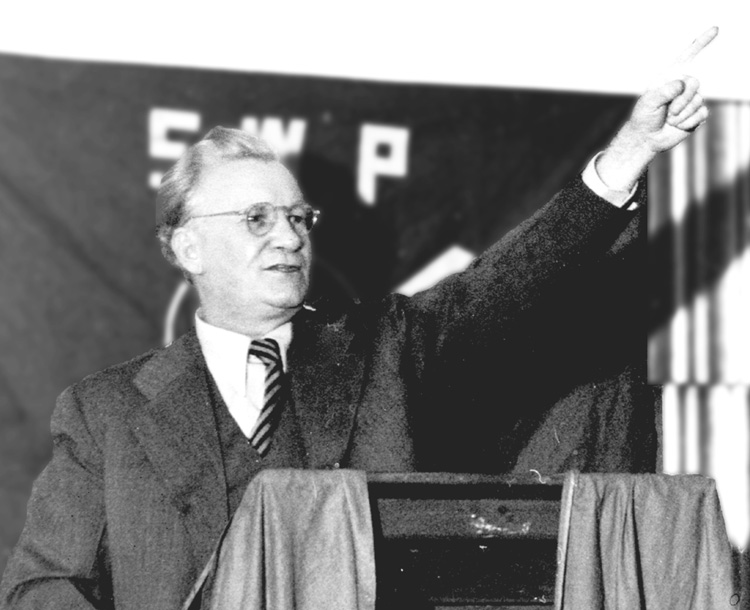Below is an excerpt from America’s Road to Socialism by James P. Cannon, one of Pathfinder’s Books of the Month for December. The book contains five talks presented at public forums by Cannon in 1952 and 1953 that describe the crisis of the capitalist system, the coming struggle by working people to take political power, and what a government of workers and farmers would do. Cannon, a founder of the Communist Party, was expelled from the CP in 1928 for his opposition to Stalinism and its overthrow of the revolutionary course of Vladimir Lenin and the Bolshevik Party under his leadership. Cannon served as national secretary of the Socialist Workers Party from its founding convention in 1938 until 1953. Copyright © 1975 by Pathfinder Press. Reprinted by permission.
And if I made a mistake, I can’t say I wasn’t warned. Quite a few practical people who were interested in my welfare and thought I was marked for success in life began to shake their heads sadly when they heard me popping off on the street corners about socialism.
“It’s a fine idea, son, but it’ll never work,” I was told. “It’s against human nature.” “There always have been rich and poor and there always will be. Be a realist. Don’t waste your life on a utopian dream that can never be realized. If you want to get ahead in this world, you’ve got to be practical and look out for Number One.”
I mention this to show you that I know all the arguments against socialism. I heard them more than forty years ago. And I won’t say that I didn’t pay attention to them. I did. Especially the argument that socialism is a utopian dream that can never be realized. I was then, as I am now, inclined to realism, and I never saw any point in expending energy on impossible and unrealizable projects. The argument that socialism is not practical and not realizable worried me.
It was this troubled frame of mind that brought me, more than forty years ago, to an open forum such as this, conducted by the Socialist Educational Society in Kansas City. I went there in search of more detailed information about this thing called socialism, which had charmed me and inspired me with its grand promise of the future society of secure peace and abundance for all; a society based on equality, solidarity, and comradeship.
It was at that forum that I got my introduction to the ideas of Marx and Engels, the ideas of scientific socialism. From the discussions of that forum and the further study inspired by them, I became acquainted with Marx’s analysis of capitalism, and his sweeping assertion that socialism is not only a good idea, but is the next inevitable stage of social evolution; that the further development of capitalism cannot lead to anything else but its downfall and the socialist reorganization of society.
That did it. That settled all my youthful doubts about practicality and realizability of the idea. It convinced me theoretically, and that is the firmest conviction there is, that all the forces of history were working on my side, on the side of socialism, and that all I had to do was lend a hand, along with others, to help the historic process along.
Compared to the privilege of participating in this magnificent historical mission, all the so-called practical concerns of life and the possible material rewards of conformity seemed trivial to me more than forty years ago, and they still do. I have never changed my mind about this question in all the intervening years. That was not because of dogmatic obstinacy, but simply because I saw no good reason to change my mind.
I have always been willing to listen to anybody who would undertake to explain or make an argument against socialism from a realistic, practical point of view. As I went along I continued to hear those arguments, and still hear them if I cock my ear in the direction of the most noise.
Every theory must be submitted to the test of events. That applies to the theory of Marxism, just as Marx ruthlessly applied it to all other theories. If I grew stronger in my socialist convictions as the years passed by, it was because it appeared to me that the development of events was confirming in life the analysis and predictions of Marx.
It was Marx himself who said that no social system can be superseded until it has exhausted its progressive capacities. If capitalism is capable of further progressive development on a world scale, and is therefore invulnerable against any attempts to change it in a radical manner, then there is not much point in arguing that socialism would be a better system.
But on the other hand, if capitalism has lost its progressive character and become reactionary, has ceased to grow and expand and develop the productive forces of the people, upon which all human welfare is based; if it has entered into its period of decline and decay—then the optimistic defenders of capitalism are in the wrong. They are the real utopians of the present day.
The issue, then, goes to the evidence, to the facts. Let us rest the case on this solid foundation of reality, and go to the facts as they have been unfolded in the great events of the past half century. If we look with clear eyes at what has already happened, we may get a good hint of what is going to happen. If we can see enough in these events to indicate a historical trend, then we can be fairly sure of what the ultimate outcome will be. It is by this method and from this point of view that I propose to discuss the international prospects of capitalism and socialism tonight. …


